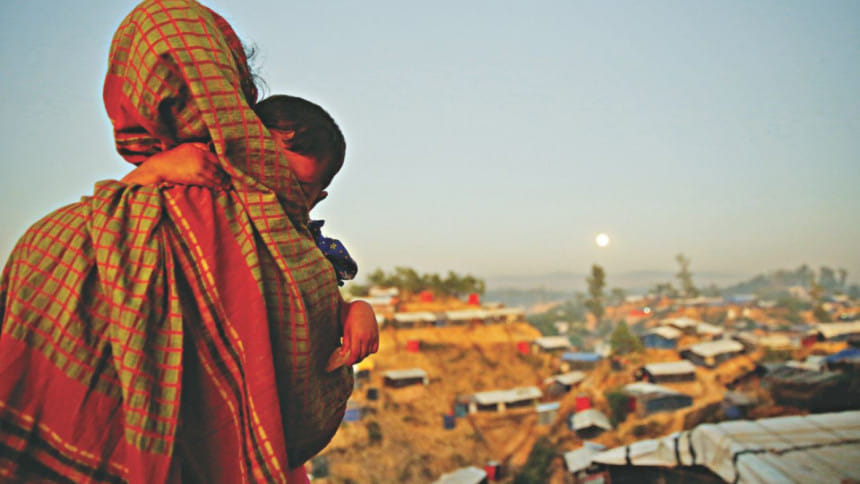Bob Rae's Rohingya report lacks a roadmap for repatriation

I was eagerly waiting for Bob Rae's report on the Rohingya refugees and their repatriation to Myanmar. Prime Minister Justin Trudeau appointed Rae, a former premier of Ontario, as Canada's Rohingya envoy on October 23, 2017. He has been tasked with engaging in diplomacy to address the ongoing violence and advising the prime minister on how Canada should support aid efforts in the region. Rae is, therefore, the "point man" for the government of Canada on the Rohingya issue. His report and recommendations will form the basis for future policy and actions by the government and, additionally, are expected to mobilise international opinion and support to finding a just solution for the Rohingyas.
Unfortunately, Rae's Interim Report, issued on December 21, largely focuses on the nature of the crisis without providing any roadmap for resolving this massive humanitarian crisis. A final report will be submitted only after another round of discussion and dialogue with Bangladesh, Myanmar, and regional/international partners in January 2018. The interim report summarises Rae's observations on the crisis, based on his visits to Rohingya camps in Cox's Bazar, joint meetings with Rohingya Muslims and Buddhists in Myanmar, and finally meetings with officials at the UN headquarters in New York.
The report focuses on three important areas: first, the humanitarian crisis resulting from the recent exodus of over 600,000 Rohingyas from Myanmar to Bangladesh and another 120,000 in abusive camp life in Rakhine state; secondly, the need to ensure the return of refugees to their homes with full political and social rights restored, which were so far denied by the largely Buddhist state; and finally, a proper and credible investigation of what happened through systematic gathering of evidence of wrongdoing.
The report thus underscores the need to inquire into the ethnic cleansing and slaughtering of Rohingyas including children and women. It is laudable that Rae has recommended an independent assessment by the international community of the allegations of crimes against humanity. Every survivor of the atrocities committed by the Myanmar military has harrowing memories of death, rape, torture, or their homes being burnt down. The interim report drew particular attention to the plight of women and their graphic accounts of sexual violence and abuse at the hands of the Myanmar military and security forces.
The atrocities continue to this day, and unless it is handled strongly by the international community, the situation will likely turn into one paralleling what Bosnia suffered between 1992 and 1995 or Rwanda in 1994. Even Myanmar is aware of the gravity of the situation, which was evident when a UN human rights investigator on a fact-finding mission was recently denied access to the country, particularly to western Rakhine State. The UN wants Myanmar leaders, including Aung San Suu Kyi, to stop the ethnic cleansing or face trials in the international court of law. The international community, therefore, should take control of the situation and deal with it on an urgent basis.
While the recent bilateral agreement between Bangladesh and Myanmar for repatriation of the refugees is a positive first step, this will not be enough for voluntary repatriation of refugees due to the lack of basic protection, security and human rights for Rohingyas in Myanmar. There is no room for forced repatriation. The international community must address these issues and work towards creating appropriate conditions for repatriation. Rae has rightly observed that there is no room for a quick fix or rapid repatriation.
The interim report also presents in great detail the squalid conditions in the makeshift refugee camps in Cox's Bazar. The camps are deplorably overcrowded and pose threats to human health and wellbeing. The refugees need proper shelter, clothing, food, medicine, and other social infrastructure and support/services in the camps. The current level of international support and resources are totally inadequate. To date, Canada has pledged USD 25 million in humanitarian assistance, contributing to UN's appeal for USD 434 million before February 2018. Canada indeed can, and should, do more to deal with the crisis.
Canadians expect more from Bob Rae in this challenging mission to address the crisis. First, Rae should engage countries like China, India, Japan and other regional/international partners to put pressure on the military and security forces in Myanmar. Second, if the Myanmar regime is unwilling to allow international investigation into the allegations of crimes against humanity, Rae should strongly recommend revocation of Aung San Suu Kyi's honorary Canadian citizenship. Third, he should work for more Canadian and international aid and support for the refugees in Bangladesh. Fourth, he should recommend the Canadian government to resettle Rohingya refugees in Canada on humanitarian grounds, in collaboration with the UNHCR multi-year plans for refugee resettlement.
Finally, in his final report, Bob Rae should recommend both short- and long-term roadmaps for repatriation of the refugees in Myanmar with dignity and honour.
Mohammad Zaman is an international development/resettlement specialist and lives in Vancouver, B.C. Canada.
Email: [email protected]





Comments